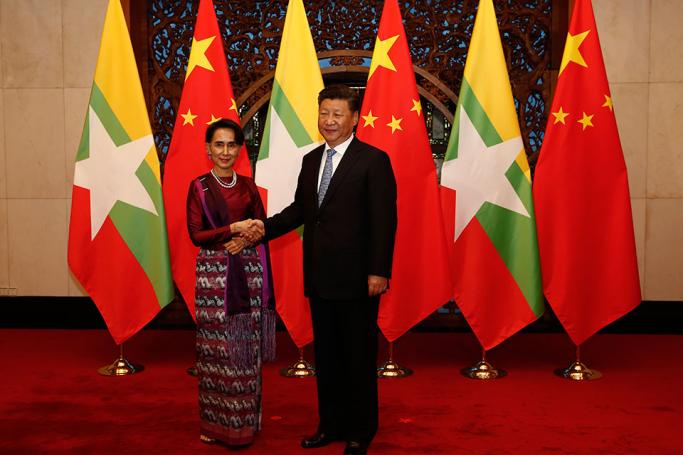Myanmar's State Counselor Aung San Suu Kyi visited China and the US in August and September, getting her foot in the door to initiate a balanced diplomacy. Her appearance has managed to promote Myanmar's new pursuits - fairness, justice and development - to the international community, a charm offensive to attract foreign investment.
No one can easily deny Myanmar's appeal for investment, but due to the poorly constructed systems in place, the way to turn this virgin land into an investment hotspot will be bumpy.
During military rule, Myanmar was an autocracy governed by strongmen. Its perennial defects, in terms of attracting foreign investment, can be temporarily remedied by unspoken rules, which resulted in serious corruption and a public backlash.
After the National League for Democracy (NLD) took power, Myanmar has transitioned from autocracy to democracy. Suu Kyi and her followers have strongly objected to authoritarianism, broken down the rampant unspoken rules and placed an emphasis on democracy and rule of law.
A responsible and clean environment has been created among Myanmese officialdom. However, the rule of law encouraged by the ruling NLD and its supporters can hardly be realized. The country's malady is not non-compliance or poor compliance of laws, but lack of laws. Its current mechanisms and systems are a bottleneck for Myanmar's development and can hardly benefit the export-orientation nature of a market economy.
Long subdued by the military junta, the NLD is short of legal talent to build the rule of law in Myanmar. The NLD-led government is caught in the dilemma of governing the state: It does not dare to delegate power to local authorities to attract foreign investment, neither does it want to indulge governance inaction. Many Chinese companies, with a stake in Myanmar, are bogged down by the stalemate.
The US and Japan have paid close attention to Myanmar's dilemma, with Washington suggesting Myanmar copy the West. On the day of Suu Kyi's arrival in the US, senators introduced the "Cardin-McCain Burma Strategy Act of 2016," demanding Myanmar meet international standards for a working environment, government transparency and human rights.
Compared to the US, Japan's offers are less intense. By relying on the non-governmental organization, Japan International Cooperation Agency (JICA) and its extensive networks in Myanmar, Japan is leading the new Myanmese government to rearrange its legal and economic mechanisms in favor of Western countries.
Meanwhile, Japan has hired international consulting firms to draw up contracts that can meet the demand of Western capital under Myanmar's current legal framework. Therefore, the interests of Japanese companies can be guaranteed.
In a contrast with the US and Japan, China has been acting too quietly during Myanmar's transition. Although limited by the non-interference principle it has stuck to for decades, China - a regional powerhouse - cannot sit idle when its neighbor is struggling for development.
The disregard is not in line with China's promise of being a responsible country. It is responsible for offering both material and intellectual support to the new Myanmese government, making sure Myanmar can choose its own path of development without being misled by outside forces.
For a long time, Chinese diplomacy has been too fragmented in imposing restrictions on the Chinese government to safeguard its interests overseas in a concerted and willful effort. Many Chinese companies in Myanmar envy what JICA has done for Japanese enterprises, expecting that China must build a similar organization and a platform to serve Chinese companies and organizations overseas. Such collaboration will raise the competitiveness of Chinese companies and secure their interests.
Myanmar is in an unstable and complicated situation, which casts new challenges for Chinese diplomats and policymakers in foreign affairs. It is time for China to imitate Japan and build a Chinese version of JICA in order to deal with the difficulties affecting China-Myanmar cooperation during Myanmar's transition.
The author is an associate research fellow at the National Institute of International Strategy, Chinese Academy of Social Sciences. [email protected] Follow us on Twitter @GTopinion
Courtesy of Global Times
You are viewing the old site.
Please update your bookmark to https://eng.mizzima.com.
Mizzima Weekly Magazine Issue...
14 December 2023
Spring Revolution Daily News f...
13 December 2023
New UK Burma sanctions welcome...
13 December 2023
Spring Revolution Daily News f...
12 December 2023
Spring Revolution Daily News f...
11 December 2023
Spring Revolution Daily News f...
08 December 2023
Spring Revolution Daily News f...
07 December 2023
Diaspora journalists increasin...
07 December 2023
Local Shan people call for their identity to be added to signboard












